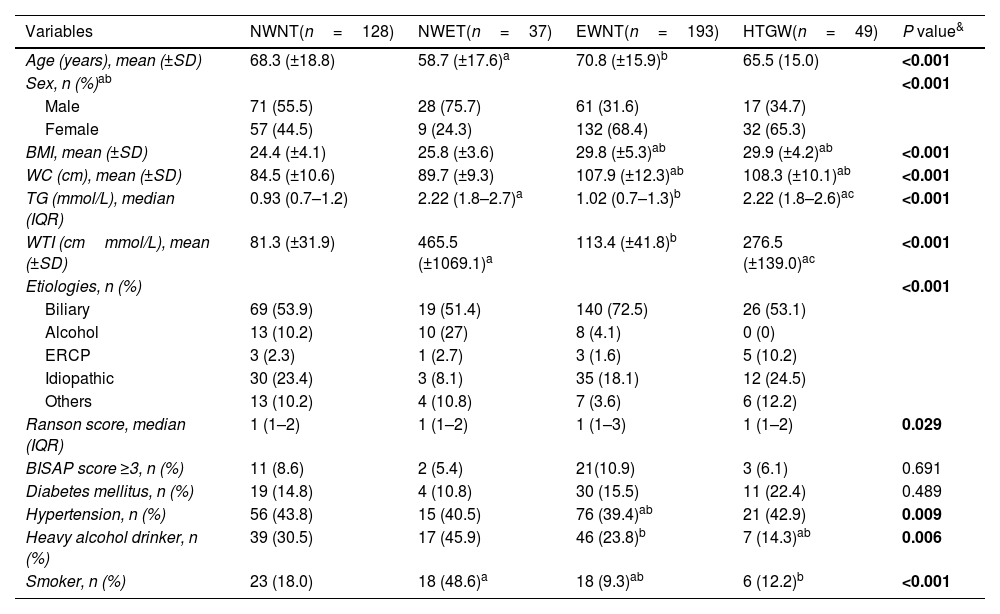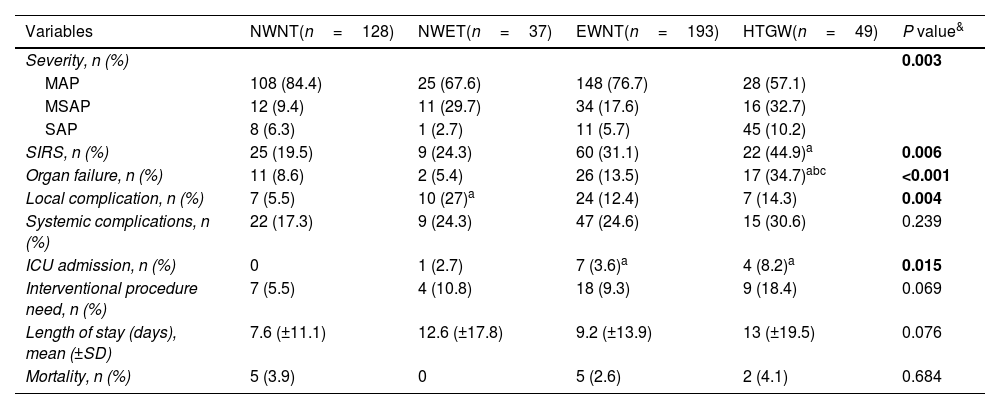Acute pancreatitis is a frequent inflammatory gastrointestinal disorder with high mortality rates in severe forms. An early evaluation of its severity is key to identify high-risk patients. This study assessed the influence of waist circumference together with hypertriglyceridemia on the severity of acute pancreatitis.
MethodsA retrospective study was performed, which included patients admitted with acute pancreatitis from March 2014 to March 2021. Patients were classified into four phenotype groups according to their waist circumference and triglyceride levels: normal waist circumference and normal triglycerides; normal waist circumference and elevated triglycerides; enlarged waist circumference and normal triglycerides; and enlarged waist circumference and triglycerides, namely hypertriglyceridemic waist (HTGW) phenotype. Clinical outcomes were compared among the groups.
Results407 patients were included. Systemic inflammatory response syndrome (SIRS) and intensive care unit admission were most frequent among patients in the HTGW phenotype group, at 44.9% and 8.2%, respectively. The incidence of local complications was higher in the normal waist circumference with elevated triglycerides group (27%). On multivariable analysis, an enlarged waist circumference was related to an increase of 4% and 2% in the likelihood of developing organ failure and SIRS, respectively. Hypertriglyceridemia was an independent risk factor for both organ failure and local complications.
ConclusionsHTGW phenotype was significant related to developing of SIRS. It seems that an enlarged waist circumference has a greater role than hypertriglyceridemia in the development of SIRS. Obesity and hypertriglyceridemia were both independent risk factors for organ failure. Patients with hypertriglyceridemia were more likely to develop local complications.
La pancreatitis aguda es una patología frecuente con altas tasas de mortalidad en sus formas graves. Este estudio evaluó la influencia de la circunferencia de la cintura (CC) junto con la hipertrigliceridemia en la gravedad de la pancreatitis aguda.
MétodosSe realizó un estudio retrospectivo que incluyó pacientes con pancreatitis aguda desde 2014 hasta 2021. Los pacientes se clasificaron en cuatro grupos fenotípicos según su CC y los niveles de triglicéridos: CC normal y triglicéridos normales, CC normal y triglicéridos elevados, CC aumentada y triglicéridos normales, y CC aumentada y triglicéridos elevados, es decir, el fenotipo cintura hipertrigliceridémica (HTGW).
ResultadosSe incluyeron 407 pacientes. El síndrome de respuesta inflamatoria sistémica (SIRS) y la admisión a la unidad de cuidados intensivos fueron más frecuentes entre los pacientes con fenotipo HTGW, en 44,9 y 8,2%, respectivamente. La incidencia de complicaciones locales fue mayor en el grupo de CC normal con triglicéridos elevados (27%). En el análisis multivariable, una CC aumentada se relacionó con un aumento de 4 y 2% en la probabilidad de desarrollar fallo orgánico y SIRS, respectivamente. La hipertrigliceridemia fue un factor de riesgo tanto para el fallo orgánico como para las complicaciones locales.
ConclusionesEl fenotipo HTGW se relacionó con el desarrollo de SIRS. Parece que una CC aumentada tiene un papel más importante que la hipertrigliceridemia en el desarrollo de SIRS. La obesidad y la hipertrigliceridemia fueron factores de riesgo independientes para el fallo orgánico. Los pacientes con hipertrigliceridemia tenían más probabilidades de desarrollar complicaciones locales.
Artículo
Comprando el artículo el PDF del mismo podrá ser descargado
Precio 19,34 €
Comprar ahora













